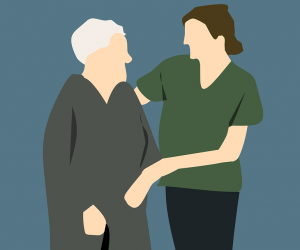Nursing Masters
Direct Entry MSNs For A Fast Track to a Nursing Master’s
 A direct entry degree program in nursing is designed to qualify you as quickly as possible for an advanced nursing position. They make it possible to start your nursing career many steps up from he bottom, even if you have not taken the educational and employment path that most RNs do in their early stage of their careers. The main beneficiaries of direct entry masters (sometimes called simply “MDE”) degrees are:
A direct entry degree program in nursing is designed to qualify you as quickly as possible for an advanced nursing position. They make it possible to start your nursing career many steps up from he bottom, even if you have not taken the educational and employment path that most RNs do in their early stage of their careers. The main beneficiaries of direct entry masters (sometimes called simply “MDE”) degrees are:- Practicing nurses (generally RNs who have come out of an associates nursing program) who do not have a BSN.
- People who have a bachelor’s degree in something other than nursing, and want move quickly through both a BSN and MSN degree and get out into the nursing workforce as fast as they can.
Confusion About Direct Entry MSNs
The problem, if you’re searching for colleges that offer this option, is that many schools with direct entry degrees call them by other names on their websites. You’ll find programs meant to get you quickly to your nursing masters called “BSN to MSN” or “nursing “bridge” programs or MSNs for non-nursing majors. Some schools call them “entry level masters” degrees. Some of the programs are in general nursing, but the most popular ones focus on preparing grads to be nurse practitioners, nurse leaders, educators or some other type of advanced practitioner. Some key points to be aware of:Getting a master’s if you’re a practicing nurse with no BSN
Working nurses who have only an ADN, ASN or AAS can find a variety of relatively quick programs designed to get them through the requirements for a BSN and then complete a master’s degree. If you do the entire program, for example, at Purdue Global’s nursing school, the entire process from start to finish, generally take around three years – one year for a compressed version of a BSN and then two more years to complete you nursing. The first part of this and many other program will provide you with the core courses needed to finish your nursing bachelors. A few of these allow you to actually take some of your MSN credits while you are earning your bachelors.MSNs for those with a non-nursing bachelors who want a career change
The steps you’ll need to take will vary depending on what you earned your bachelor’s degree in. It won’t be necessary to re-take any courses. You’ll find that some direct entry MSN schools only admit students with bachelor’s in a health-related subject. Other schools are more open accepting people with non-nursing majors from all academic backgrounds. Before truly diving into your master’s program work, you will be required to take some prerequisite “core” courses in health science topics like biology, nutrition or public health. Some schools also give preference to applicants that have some kind of clinical experience either as a volunteer nursing assistant in a hospital or through training to be an EMS. In most cases it should take three years of study at a normal past to complete all aspects of this type of degree.Similar approach with entry level nursing (ELM) programs
ELM is essentially another term that describes a direct entry program. It’s a master’s degree designed for a student who has an undergraduate degree in something other than nursing. Most programs have a requirement that if you are taking an entry level nursing masters, you must finish a certain portion of your training aimed at licensure, and then pass your NCLEX-RN exam at a specific point in the program. It’s important to be aware that, while most of these MSNs take two years to complete, there are a wide variety of course structures, meaning that the degree can be completed in different time frames at different colleges. Some grad programs will allow you to get out and start your nursing career in less than two years. A search for entry level MSN’s will turn up many of the same schools you’ll find looking for direct entry programs.Does every school require GRE tests?
The Graduate Record Examination or GRE test is accepted by many schools offering all types of masters. But in many cases today it’s not required. If can be to your advantage to take the general GRE if you feel you will be successful at demonstrating your verbal and mathematic analytical skills. Additionally, you can take a subject specific GRE in biology, chemistry or other science area, which can be of value if you got a humanities bachelor degree and would like to demonstrate that you have a strong aptitude for the sciences. But before you make this effort, look closely at the school you want to get your MSN from. If you’re not a great test-taker, he school may be willing to accept you without any GRE test score.Reasons To Get Your MSN
The goal of virtually all direct entry MSN program students is to get their bachelors and masters degree in less time and at less cost than it would take to do the two degrees separately. The specialization areas that these masters degrees can open up include:- Nurse Practitioner
- Nurse Educator
- Nurse Midwife
- Clinical Nurse Leader
- Executive Nursing Manager
- Nurse Case Manager
Which is harder, NP School or PA School?
Nurse Practitioner and Physician Assistant programs are both among the most demanding in the health field. For someone who is looking to get into direct patient care, the only more difficult path would be to go to medical school with the goal of being a full-fledged MD. Many students see less value becoming a doctor than in the past. The cost of medical school is tremendous, the time commitment, particularly when you consider the internship most young doctors have to do after they graduate from med school, can be anywhere from six to 10 years, and the career of a physician tends to pay less and involve much more stress than it once did. That’s not to say it’s easy to become an NP or PA. Both courses of study can require up to two thousand hours of clinical study. In terms of time commitments, which type of degree is tougher can depend on how you choose to pursue it. NPs tend to specialize in a particular area like midwifery, while PA’s generally are generalists. PA school is generally three years in length. The effort required to become an NP, on the other hand, is highly variable. Depending on whether you obtain an MSN degree or take a “bridge” program or a direct entry degree that gives you a BSN plus an MSN in an abbreviated time frame. Many nurses are attracted to these specialties because they can allow you to practice with more independence than a nurse can in a typical hospital setting. Also, both NPs and PAs generally earn an average salary in excess of $100.000. per year. If you’re thinking of going the NP route, however, be aware that it has become more of an expectation in the health field that a practicing NP should have a doctorate or DNP degree. This isn’t necessarily a hard and fast rule, but it’s something to consider, as the doctorate degree can involve a good deal of work and extra time on your part.Here are examples of requirements for some key online direct entry msn programs
Purdue Global Purdue is a public school that’s now one of the largest online learning providers in the U.S. It’s fast track RN to BSN degree is: For RNs who have a nursing associates’s degree or diploma. As students complete their studies for a BSN, they also take core requirements for the school’s master’s degree in nursing. Upon completing the BSN and masters core requirements, the student’s can take a “condensed” MSN program that can be completed more quickly than a standard program. Purdue Global’s Accelerated BSN to MSN See all of Purdue Global’s degree programs Walden University Walden offers several “bridge” programs that can be RN to MSN track for practicing nurses with a hospital diploma or associate degree, or can be taken as RN to BSN “Accelerate into Master’s” (AIM) track where students earn credits toward a master’s as they complete a bachelor’s degree. MS Bridge for Registered Nurses – Education MS in Nursing Bridge – Nursing Informatics MS in Nursing – Bridge for Registered Nurses – Adult & Gerontology Acute Care Nurse Practitioner See all of Walden’s programs Grand Canyon University Grand Canyon has several bridge programs designed for RNs who have a bachelor’s degree in health sciences or some other related field. After completing prerequisites for a nursing bachelor’s, students choose a track for their MSN: MS in Nursing Education – Bridge MS in Nursing – Public Health – Bridge MS in Nursing – Emphasis in Leadership in Health Care Systems – Bridge Search Full Database of Online Nursing Master’s SchoolsQuality, Most Affordable Nursing Masters Programs Online
 Nursing master’s degrees are for RNs who want to become qualified to move into more senior positions as hospital administrators or nurse educators, or who want to work in advanced clinical areas like informatics, nurse practitioner or nurse midwifery.
Nursing master’s degrees are for RNs who want to become qualified to move into more senior positions as hospital administrators or nurse educators, or who want to work in advanced clinical areas like informatics, nurse practitioner or nurse midwifery.
More Than A BSN
More and more hospitals across the U.S. have moved to a policy of hiring only nurses with BSN degrees (read here about the ANCC’s “Magnet Recognition Program”. While that’s expected to improve the quality of care, it’s also meant that the BSN degree on it’s own is less of a distinguishing factor for a nurse who wants to move beyond “floor” nursing in a hospital unit. Hence the growing popularity of nursing master’s degrees. Some of the least expensive online nursing master’s programs are offered by state universities. One caveat, however, is that many of them charge out-of-state students a far higher tuition rate than students who live within the state. Online degree programs from the better-known distance learning schools like Kaplan, Grand Canyon and others may be a bit more expensive than the state schools, but they generally don’t charge more for out-of-state learners, and are extremely focused on catering to working nurses who may need to take breaks from their degree programs to attend to family needs, and who may need significant help in the area of financial aid. Many of the larger schools also offer “accelerated” degree options that allow you to complete an MSN more quickly, while some offer RN to MSN “bridge” degrees that allow you to go directly from RN to master’s without taking several years to complete a nursing bachelor’s degree.Filling A Need For Affordable Care
Demand for advanced practice nurses with master’s degrees is likely to grow over the long run as our society ages, more complex treatment regimens are developed, and hospitals and clinics look for practitioners who can deliver high quality care at a lower cost than what physicians can do (BLS). Salaries vary widely from nurse educators to nurse practitioners, but virtually all jobs that require a nursing masters pay more than those that require only a BSN. The listing below of affordable online nursing master’s degree programs is based primarily on our research of cost per credit. Your net cost at any nursing graduate school will vary greatly depending on offers of financial aid, any credit transfer you may be able to do for previous schoolwork, and length of program. It pays to shop around and ask lots of questions before committing to a degree program.Good, Reasonably Priced Online RN to BSN Programs
Sponsored SchoolsLiberty University
Founded in 1971 by Reverend Jerry Falwell, Liberty is a private Christian school that has grown into the largest Evangelical university in the world, with 13,000 undergraduate students and 5,800 post grads on it’s campus in Lynchburg, Virginia. But it’s the online learning program at Liberty that’s truly massive. The school currently educates over 50,000 students every year through distance learning, with over 70 different academic specialties and degrees at the associates, bachelor and masters levels. It’s master’s programs in nursing are not at the bottom of the spectrum, but are in a moderate range.
Master of Science, Nursing Administration
Master of Science, Nursing Educator
University of Texas at Arlington
UT Arlington is a very large school with over 41,000 students. It’s nursing school says that “With low tuition rates and financial aid, our goal is to keep your costs low and your debt manageable.” The school offers an option to pay by the course as you go. Online degrees offered include:
– MSN Nurse Educator
– MSN Family Practitioner
– MSN Nursing Administration
Get free info on UT Artlington’s RN to BSN program
Would You Be Happier as A Doctor or A Nurse Practitioner? Surprising Trends
 Once, there was little doubt that becoming an MD was an amazingly attractive career choice. Physicians were paid well, highly respected and, for the most part, acted as their own bosses.
But times have changed.
College counselors report that as pre-med students finish their undergraduate degrees, a small but growing number of them are making a surprising choice. Rather than going on to medical school to become doctors, they’re heading to nursing graduate schools that will train them to become nurse practitioners. Financial and lifestyle issues in the healthcare industry are feeding the trend.
Once, there was little doubt that becoming an MD was an amazingly attractive career choice. Physicians were paid well, highly respected and, for the most part, acted as their own bosses.
But times have changed.
College counselors report that as pre-med students finish their undergraduate degrees, a small but growing number of them are making a surprising choice. Rather than going on to medical school to become doctors, they’re heading to nursing graduate schools that will train them to become nurse practitioners. Financial and lifestyle issues in the healthcare industry are feeding the trend.
Doctors Under Stress
Doctors still earn handsome salaries – if they’re in the right specialty. According to a 2017 Medscape survey, MD salaries run in a wide range from about $158,000 per year for pediatricians to almost $500,000 for plastic surgeons. Nurse practitioners, by comparison, generally earn $73,951 to $122,007 according to payscale.com, though some top nurse anesthetists earning over $240,000 in certain states according to Beckers Hospital Review. But while doctors may earn more over their lifetimes, they’re now feeling a ton of stress from America’s relentless drive to contain health costs and make care more efficient. A 2018 survey by Medscape showed that 42% of physicians interviewed felt burned out and 15% were downright depressed. Women doctors, who have grown in numbers over the past 20 years, are even more burned out than their male counterparts. Forty-eight per cent of female doctors told Medscape they were burned out, compared with 38% of male MDs. Why isn’t being a doctor the kind of “golden parachute” it once was? MDs in the Medscape survey said they were sick and tired of spending too little time with patients and too much time on paperwork. Four out of ten said they were working too many hours and 26% said they did not feel respected by employers or coworkers.The New Nurse Practitioners
Some see the nurse practitioner career path as more attractive because it involves a far lower cost of training and more appealing work conditions than what doctors deal with. “You can become a nurse practitioner for…typically around $50,000 to $60,000,” says Ora Strickland, Dean of the College of Nursing and Health Sciences at Florida International University in an interview with U.S. News & World Report. Newly minted doctors, on the other hand, often emerge from medical school with over $160,000 in student debt. Tough Early Years for MDs Physicians must also do residencies after they finish medical school, which pay an average of about $55,000 per year (source: Medscape). The long hours and stress of medical residency are legendary. And when physicians emerge from residency and start out in hospital or private practice, they may be 30 years old and just beginning to earn the kind of money that can help them pay down their medical school debts. They may ultimately reach a high salary level, but getting there is a long, tough road. NPs May Do Better As a result, some nurse practitioners actually earn a higher salary early in their careers than the typical physician. They can also get out into full clinical practice at an early age and avoid the stress of residency. NPs have gradually gained more power and autonomy. Although they are unlikely to ever handle the kind of top level decisions doctors make on treatment of complex cases, most NPs are now authorized to diagnose a wide range of conditions and prescribe treatments for them. If you wish to become a nurse practitioner, it pays to research what the practice parameters for NPs are in your state.Nurse Patient Advocacy Can Improve Your Nursing Career
 Young nurses are all taught the concept of nurse patient advocacy. But when they get out into the real world of hospital practice, they’re often given little or no help in figuring out how to actually practice it.
Advocating for patients can boost your professional image and enhance the personal satisfaction you get from nursing. But it can also put you in a position of conflict with doctors or other nurses involved in the care of your patients. Being successful at it requires the careful use of your “people management” skills.
Young nurses are all taught the concept of nurse patient advocacy. But when they get out into the real world of hospital practice, they’re often given little or no help in figuring out how to actually practice it.
Advocating for patients can boost your professional image and enhance the personal satisfaction you get from nursing. But it can also put you in a position of conflict with doctors or other nurses involved in the care of your patients. Being successful at it requires the careful use of your “people management” skills.
A Job Only a Nurse Can Do
Nurses spend more time in direct care of the patient than anyone else on the clinical team. In that capacity, the American Nurses Association (ANA) Code of Ethics specifies that you re expected to make sure that:- The privacy rights of the patient are observed.
- Regardless of social or economic position, every patient is treated with the same level of dignity.
- Your patient is educated to make informed choices on possible tests and procedures, and that he or she receives strong emotional support while they are being cared for.